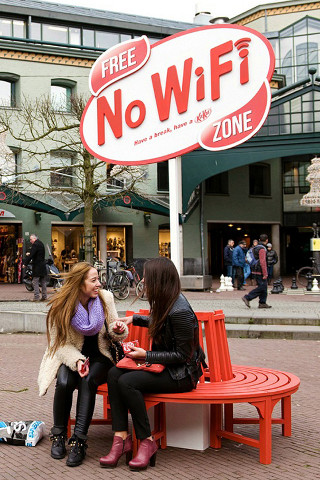Monday 4 February, 2013, 05:57 - Spectrum Management
Posted by Administrator
Wireless Waffle has reported many times on the issue of jamming. Jamming, put simply, is the transmission of one radio signal in such a way as to intentionally block another one from being received. It is the intentional nature of jamming that distinguishes it from other kinds of radio interference. Posted by Administrator
Usually jamming is used for the purposes of disrupting something that the person doing the jamming does not wish to be received. Recently the BBC's satellite services have been jammed by both Syria and Iran who do not want the BBC's version of the news to reach their citizens. To this end, jammning is also illegal, as any kind of intentional radio interference usually is.
There are instances where jamming is sanctioned. In jails in some countries, for example, jammers which block cellular frequencies are used to stop inmates from using mobile phones to communicate to the outside world. Cellular jammers are also used in some mosques to ensure that peace and quiet is not disrupted by the 'Grande Valse'. It is believed that some theatres and cinemas also use cellular jammers to stop mobile phones spoiling the show. Unless explicit authority is gained fromt the regulator of the country concerned, though, the use of jammers, even where the purpose may seem harmless remains illegal. The illegality of jamming means that it is not usually advertised by those doing it.
 So step forward chocolate bar Kit Kat who has established 'no WiFi' benches in the Dutch capital Amsterdam. At these benches WiFi is jammed with the idea being that you can go and sit on them and disconnect from the hecticities of daily life and 'have a break, have a Kit Kat'. An interesting question therefore arises as to whether the activities of Kit Kat are illegal or not. Whilst jamming per se is normally illegal, the bands in which WiFi operates (both 2.4 and 5 GHz) are licensed for many more services than just WiFi. In the 2.4 GHz band, for example, it is also legal to operate wireless video cameras, bluetooth, microwave ovens, cordless phones, remote control toys, and many more devices. Some of these devices would have the potential to knock-out WiFi links. CCTV cameras, for example, transmit a continuous signal which would do a good job of jamming WiFi and other services that were nearby.
So step forward chocolate bar Kit Kat who has established 'no WiFi' benches in the Dutch capital Amsterdam. At these benches WiFi is jammed with the idea being that you can go and sit on them and disconnect from the hecticities of daily life and 'have a break, have a Kit Kat'. An interesting question therefore arises as to whether the activities of Kit Kat are illegal or not. Whilst jamming per se is normally illegal, the bands in which WiFi operates (both 2.4 and 5 GHz) are licensed for many more services than just WiFi. In the 2.4 GHz band, for example, it is also legal to operate wireless video cameras, bluetooth, microwave ovens, cordless phones, remote control toys, and many more devices. Some of these devices would have the potential to knock-out WiFi links. CCTV cameras, for example, transmit a continuous signal which would do a good job of jamming WiFi and other services that were nearby.It would therefore be possible (and legal) to run a number of wireless cameras, on adjacent frequencies such that the whole 2.4 GHz band was jammed. Around 4 wireless cameras would be needed to do this. Now disconnect the camera and just put the transmitter in place and this remains legal (as it is the transmitter which is regulated, not the content). Lo and behold, it would be legally possible to jam all WiFi signals in a limited location. Whilst this is legal from an equipment perspective, whether or not doing this for the purpose of jamming WiFi rather than for transmitting video pictures opens up another legal issue. Article 15 of the ITU radio regulations says:
All stations are forbidden to carry out unnecessary transmissions, or the transmission of superfluous signals, or the transmission of false or misleading signals, or the transmission of signals without identification
Signals that were there for the purpose of stopping other signals being received would surely be 'superfluous'. In addition, article 45 of the ITU radio regulations states:
All stations, whatever their purpose, must be established and operated in such a manner as not to cause harmful interference to the radio services or communications of other Member States or of recognized operating agencies, or of other duly authorized operating agencies which carry on a radio service, and which operate in accordance with the provisions of the Radio Regulations
 So if the purpose of running the wireless cameras was specifically to jam WiFi signals, and assuming that those WiFi signals were operating in accordance with the provision of the ITU Radio Regulations, they would remain illegal.
So if the purpose of running the wireless cameras was specifically to jam WiFi signals, and assuming that those WiFi signals were operating in accordance with the provision of the ITU Radio Regulations, they would remain illegal. Whether the Kit Kat 'WiFi free' areas are legal or not is therefore a subject that is, perhaps, open for discussion. Whether they are a good idea is equally subject to debate. Whether or not Kit Kat's are the right chocolate bar to have with a cup of tea (or coffee) during tea-breaks is, though, surely not a question that requires much debate. After all, they can't be all bad, if Cheryl Cole recommends them, right?
add comment
( 2298 views )
| permalink
| 



 ( 2.9 / 1652 )
( 2.9 / 1652 )




 ( 2.9 / 1652 )
( 2.9 / 1652 )

